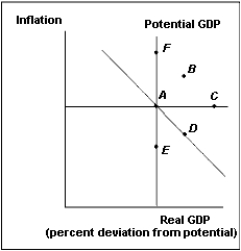Exam 13: Using the Economic Fluctuations Model
Exam 1: The Central Idea157 Questions
Exam 2: Observing and Explaining the Economy107 Questions
Exam 3: The Supply and Demand Model170 Questions
Exam 4: Subtleties of the Supply and Demand Model: Price Floors, Price Ceilings, and Elasticity182 Questions
Exam 5: Macroeconomics: the Big Picture157 Questions
Exam 6: Measuring the Production, Income, and Spending of Nations180 Questions
Exam 7: The Spending Allocation Model170 Questions
Exam 8: Unemployment and Employment215 Questions
Exam 9: Productivity and Economic Growth165 Questions
Exam 10: Money and Inflation154 Questions
Exam 11: The Nature and Causes of Economic Fluctuations169 Questions
Exam 22: Deriving the Formula for the Keynesian Multiplier and the Forward-Looking Consumption Model28 Questions
Exam 12: The Economic Fluctuations Model206 Questions
Exam 13: Using the Economic Fluctuations Model178 Questions
Exam 14: Fiscal Policy139 Questions
Exam 15: Monetary Policy173 Questions
Exam 16: Capital and Financial Markets174 Questions
Exam 17: Economic Growth and Globalization164 Questions
Exam 18: International Trade250 Questions
Exam 19: International Finance125 Questions
Exam 20: Reading, Understanding, and Creating Graphs35 Questions
Exam 21: the Miracle of Compound Growth11 Questions
Exam 23: Present Discounted Value16 Questions
Exam 24: Deriving the Growth Accounting Formula13 Questions
Select questions type
Recent economic fluctuations in the U.S. economy are best explained by
(Multiple Choice)
4.8/5  (32)
(32)
Among economists, there is a consensus that the recovery from the Great Depression was due to
(Multiple Choice)
4.8/5  (33)
(33)
Explain what effect a monetary policy designed to bring about disinflation would have on the economy. Be sure to discuss what happens in the short run, the medium run, and the long run.
(Essay)
4.9/5  (34)
(34)
Discuss why the Fed may in some cases need to cause a small recession to reduce inflation in the economy. Hint: Think about how firms set their prices.
(Essay)
4.9/5  (27)
(27)
In the economic fluctuations model, the so-called long run normally refers to the time it takes for the economy to return to full employment or, in other words, for real GDP to be back to potential GDP.
(True/False)
4.8/5  (41)
(41)
Exhibit 25-1  -Suppose the economy is initially at point A in Exhibit 25-1. If government purchases increase, which point best depicts where the economy will be in the long run as a result of the change in spending?
-Suppose the economy is initially at point A in Exhibit 25-1. If government purchases increase, which point best depicts where the economy will be in the long run as a result of the change in spending?
(Multiple Choice)
4.8/5  (28)
(28)
Assume that real and potential GDP are initially equal. If government purchases permanently increase, we would expect that in the short run
(Multiple Choice)
4.8/5  (40)
(40)
In 2008, stock markets in the United States and worldwide registered
(Multiple Choice)
4.9/5  (32)
(32)
In economics, the short run is an expression used to describe events that take at least two to three weeks to unfold.
(True/False)
4.8/5  (41)
(41)
In a diagram that includes both the IA line and the AD curve, the price adjustment resulting from an increase in spending is shown by
(Multiple Choice)
4.7/5  (32)
(32)
The tendency of prices to adjust over time is shown by an upward movement along the IA line.
(True/False)
4.8/5  (39)
(39)
Answer the questions below:
(A)Is there a unique rate of inflation that corresponds to long-run equilibrium? Explain. What determines the rate of inflation when the economy is at long-run equilibrium?
(B)Suppose the central bank is interested in stimulating growth in the economy. Should it aim for a higher or lower target inflation rate? Will higher growth be achieved in the short run and the long run?
(Essay)
4.9/5  (36)
(36)
If the Fed raises interest rates because inflation is too high, this will cause
(Multiple Choice)
4.8/5  (27)
(27)
Suppose government purchases have decreased and the economy has reached a new long-run equilibrium. Which of the following best describes the new equilibrium?
(Multiple Choice)
4.9/5  (33)
(33)
Suppose the Fed engages in a policy to reduce the inflation rate for any given level of real GDP. This would be depicted by a(n)
(Multiple Choice)
4.8/5  (36)
(36)
Showing 81 - 100 of 178
Filters
- Essay(0)
- Multiple Choice(0)
- Short Answer(0)
- True False(0)
- Matching(0)